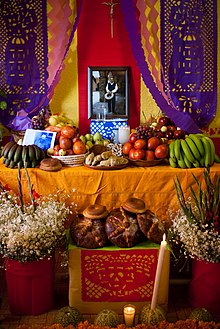Portal:Religion
The Religion Portal
Religion is a range of social-cultural systems, including designated behaviors and practices, morals, beliefs, worldviews, texts, sanctified places, prophecies, ethics, or organizations, that generally relate humanity to supernatural, transcendental, and spiritual elements—although there is no scholarly consensus over what precisely constitutes a religion. Different religions may or may not contain various elements ranging from the divine, sacredness, faith, and a supernatural being or beings. (Full article...)
 Vital article
Vital article
Atheism, in the broadest sense, is an absence of belief in the existence of deities. Less broadly, atheism is a rejection of the belief that any deities exist. In an even narrower sense, atheism is specifically the position that there are no deities. Atheism is contrasted with theism, which in its most general form is the belief that at least one deity exists. (Full article...)
 Did you know (auto-generated)
Did you know (auto-generated)
- ... that Catherine de Parthenay, a 16th-century Huguenot leader, was a member of "a highly successful network of information" during the French Wars of Religion?
- ... that in her 2021 book White Evangelical Racism, professor of religion Anthea Butler called American evangelicalism a pro-Trump, "nationalistic political movement"?
- ... that Musa va 'Uj depicts figures from all three Abrahamic religions?
- ... that a religious community is a group of people who practice the same religion, but do not have to live together?
- ... that the capital of South Ossetia once had more Jews than Ossetians?
- ... that Freedom of Religion South Africa filed an unsuccessful lawsuit to keep child spanking legal?

Several attempts at a Franco-Mongol alliance against the Islamic caliphates, their common enemy, were made by various leaders among the Frankish Crusaders and the Mongol Empire in the 13th century. Such an alliance might have seemed an obvious choice: the Mongols were already sympathetic to Christianity, given the presence of many influential Nestorian Christians in the Mongol court. The Franks—Western Europeans, and those in the Levantine Crusader states—were open to the idea of support from the East, in part owing to the long-running legend of the mythical Prester John, an Eastern king in an Eastern kingdom who many believed would one day come to the assistance of the Crusaders in the Holy Land. The Franks and Mongols also shared a common enemy in the Muslims. However, despite many messages, gifts, and emissaries over the course of several decades, the often-proposed alliance never came to fruition. (Full article...)


































































